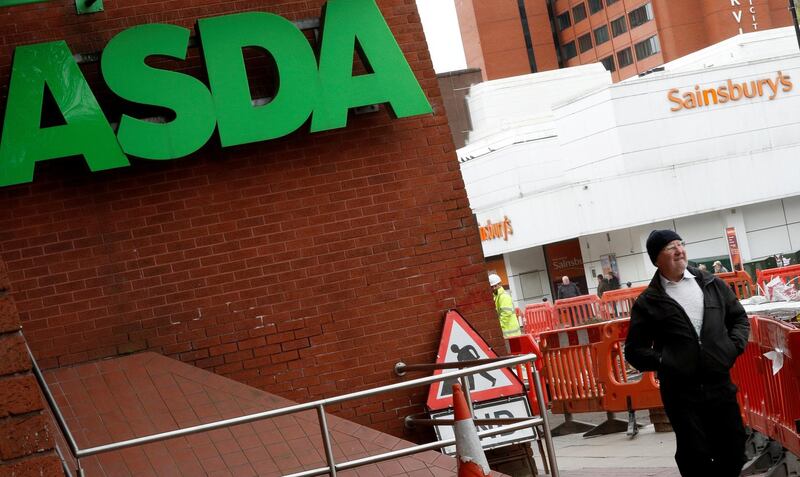Sainsbury has lost its status as Britain's second-biggest supermarket group by market share to overtake target Asda for the first time in four years, industry data showed on Tuesday.
Sainsbury's sales fell 1.8 per cent over the 12 weeks to March 24, reducing its market share to 15.3 per cent from 15.8 per cent in the same period last year, researcher Kantar said. That meant Asda, the British arm of US retailer Walmart , overtook Sainsbury with a market share of 15.4 per cent as its sales edged up 0.1 per cent, though Sainsbury remained the biggest seller of food and drink of the two.
Sainsbury argues that Kantar under-reads its general merchandise market share. This is because since acquiring Argos in 2016, Sainsbury has streamlined general merchandise ranges in its stores in favour of Argos ranges. However, Argos' sales are not captured by Kantar, according to Reuters.
Sainsbury's agreed £7.3 billion (Dh35.03bn) takeover of Asda is being considered by Britain's competition regulator.
The Competition and Markets Authority (CMA) said last month its initial view was that the deal should be blocked in the absence of the sale of a large number of stores, or even one of the brands. A final report is due by April 30.
In response Sainsbury offered to sell between 125 and 150 stores to a rival as it seeks to overcome the CMA’s hostility, which in February stunned the grocers by all but blocking the deal, according to Bloomberg. The regulator said its initial view was that even with substantial store divestitures, the combination would likely bring higher prices and worse choice for shoppers.
The CMA’s demands appear "to have been designed to be impossible to implement. As such it is prohibition in all but name", the supermarket chains said at the time in a response document to the regulator.
The anti-trust regulator should use a higher threshold of consumer harm in its analysis, the supermarkets said, a calculation that would drastically cut the potential areas of concern from 629 local areas to 182. The offer comes on top of an earlier pledge detailed by Sainsbury to reduce prices by more than $1bn over the next three years.
"Walmart's subsidiary seems to be holding up much better to the growing Sainsbury's merger uncertainty," analysts at Jefferies said on Tuesday.
Sainsbury shares, down 26 per cent over the last six months, were down 0.9 per cent at 232.5 pence by 08.25 GMT, giving it an equity value of £5.1bn. Kantar's data also showed Tesco's sales rose 0.5 per cent in the period and it remained the clear market leader with a share of 27.4 per cent.
Sales at the fourth-biggest player Morrisons fell 0.1 per cent, giving it a market share of 10.3 per cent.
However, all of Britain's big four supermarkets lost market share to German-owned discounters Aldi and Lidl. Their sales increased 10.6 per cent and 5.8 per cent respectively, giving them a combined market share of 13.6 per cent.
Kantar said overall UK grocery sales grew 1.4 per cent in the period, the slowest rate since March 2018, reflecting a later Easter this year and Mother's Day falling outside the reported period.
The market researcher said grocery inflation was 1.5 per cent over the 12 weeks. Prices are rising fastest in markets such as cola, crisps and chilled deserts, while falling in instant coffee, fresh sausages and nuts.







